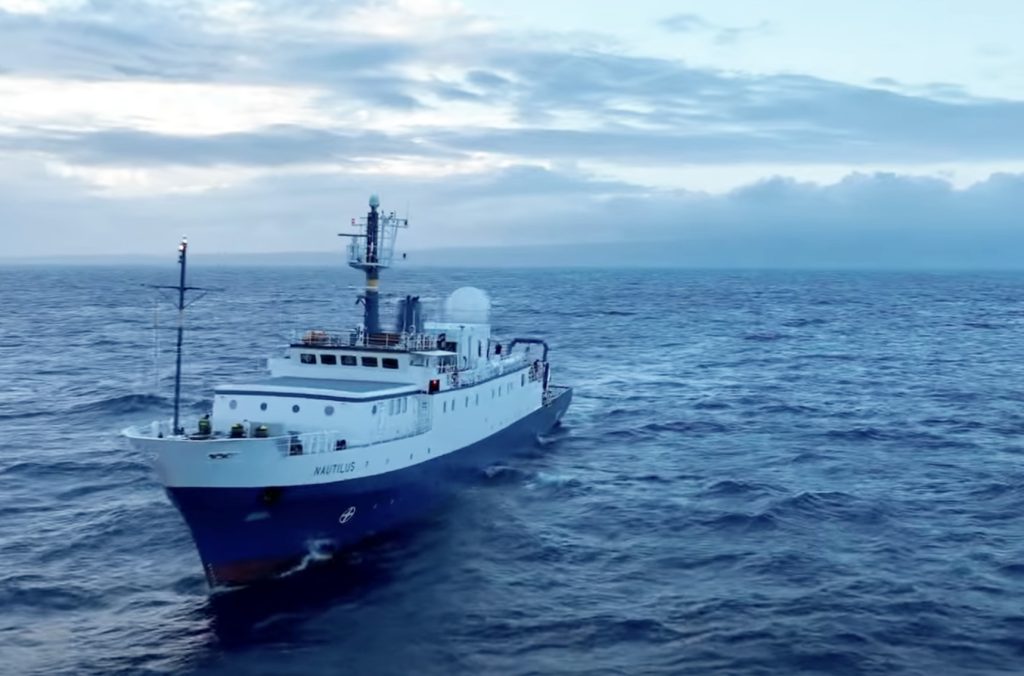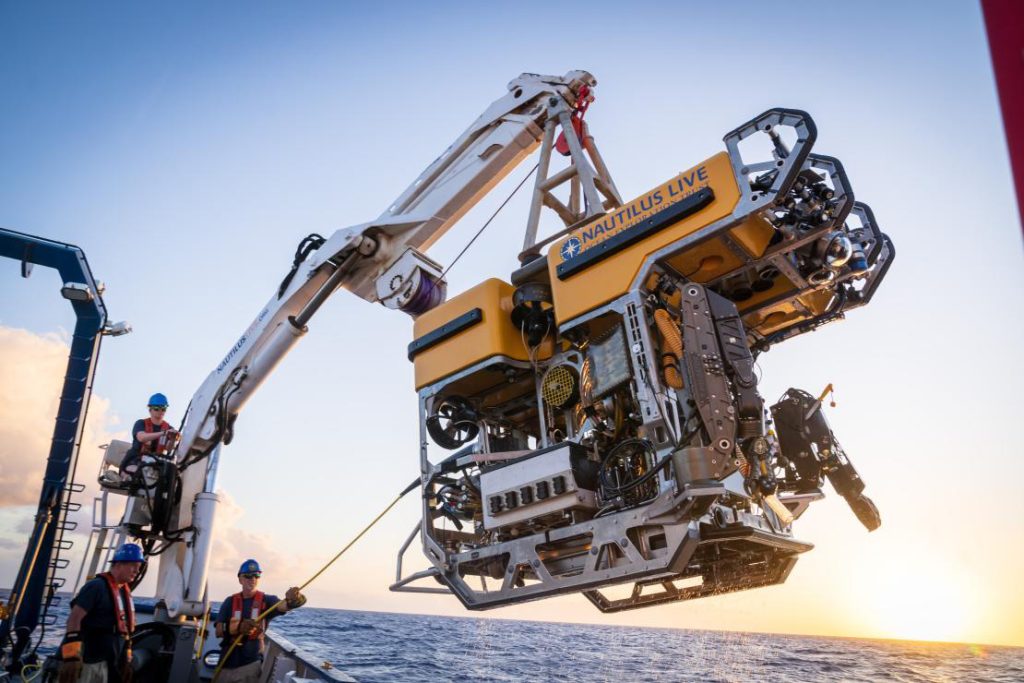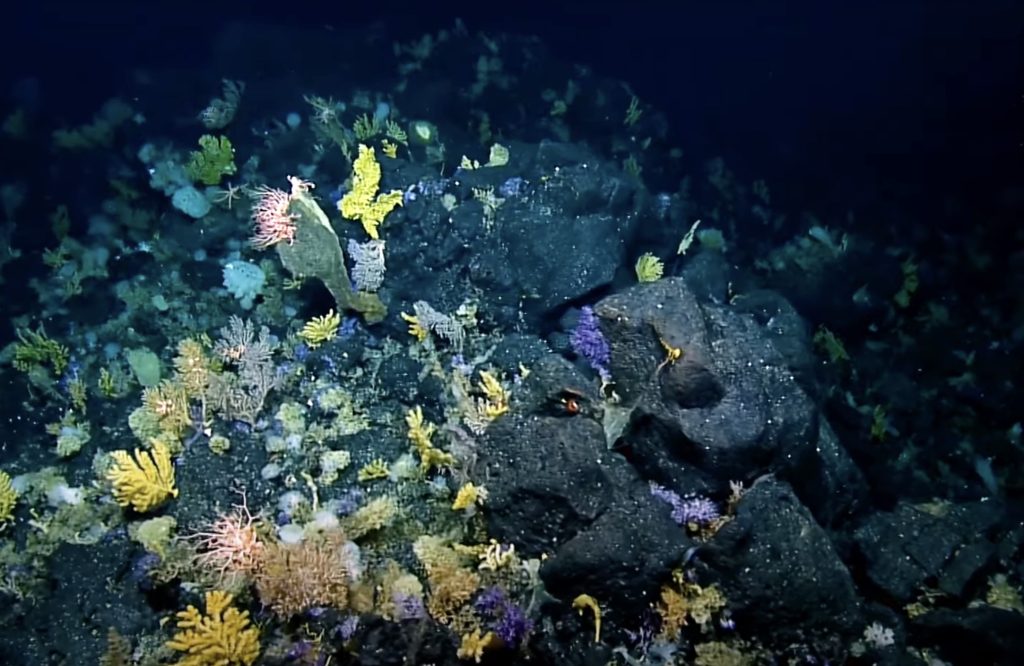 University of Hawaiʻi at Hilo student Hayden Niles will embark on a deep-sea exploration as an intern on E/V Nautilus. (Courtesy of Ocean Exploration Trust)
University of Hawaiʻi at Hilo student Hayden Niles will embark on a deep-sea exploration as an intern on E/V Nautilus. (Courtesy of Ocean Exploration Trust)
From landlocked to open ocean, University of Hawaiʻi at Hilo senior Hayden Niles is setting sail to explore deep-sea biology and geology in the western Pacific.
Niles, 21, was selected as one of 14 interns from hundreds of applicants to join a team from the Ocean Exploration Trust to explore deep-sea habitats around the Marshall Islands using the mapping, remotely operated vehicles and telepresence systems of the E/V Nautilus, a 68-meter research vessel.
The 21-day expedition takes place July 27 to Aug. 17.
Niles will be interning on the E/V Nautilus as they go on a 21-day expedition to the Republic of the Marshall Islands, an atoll-based country of more than 1,200 islands surrounded by 2.13 million square kilometers of ocean, where a vast majority of the ocean has never been surveyed.
Niles will be working with scientists, engineers and other students to collect critical ocean baseline information to support the Marshall Islands Marine Spatial Planning process, a comprehensive effort to manage the country’s marine resources sustainably.
 A screenshot of the E/V Nautilus from a video. (Courtesy of Ocean Exploration Trust)
A screenshot of the E/V Nautilus from a video. (Courtesy of Ocean Exploration Trust)
ARTICLE CONTINUES BELOW ADARTICLE CONTINUES BELOW AD
Despite data gaps, it’s known that the deep sea of Aolepān Aorōkin Ṃajeḷ hosts rich and diverse marine resources, including more than 300 unexplored seamounts, extensive deep-sea ridges and escarpments, and numerous historically significant underwater cultural heritage sites from World War II.
“I’ve always been fascinated by deep-sea gigantism and how we’ve barely scratched the surface of organisms affected by this phenomenon,” Niles said. “We will be surveying parts of the ocean that have never been seen and being part of this experience will be surreal for me.”
Although he grew up in the landlocked state of South Dakota, Niles has always held a deep curiosity for the ocean, which led him to pursue a degree in marine science.
“As a child, I played a Wii game called ‘Endless Ocean: Blue World,’ which let me explore the ocean as if I were actually there,” Niles said. “I was fascinated by the depths of the ocean and would often ask myself, ‘What else could be down there?’”
This sparked his curiosity, leading him to read and watch programs about the ocean, which further fueled his interest.
ARTICLE CONTINUES BELOW AD
Niles decided to pursue deep-sea exploration as a career when he was a fisheries intern at Blue Dog Lake State Fish Hatchery in South Dakota, where he gained hands-on experience in water chemistry monitoring, fish transportation, population surveys and managing hatchery water systems.
He then worked as a fisheries technician with South Dakota Game, Fish and Parks, focusing on fish population surveying and field sampling.
“I’ve learned that ocean exploration isn’t just for those living on the coast, but also for people from landlocked areas like me,” Niles said. “I wanted to expand my knowledge, though, which led me to the decision to attend the University of Hawaiʻi at Hilo to pursue my marine science degree.”
At the school, Niles has been able to develop his skills and knowledge through coursework and hands-on experiences, including scuba diving and underwater surveys.
 Remote operating vehicle Hercules on the E/V Nautilus (Courtesy of Ocean Exploration Trust)
Remote operating vehicle Hercules on the E/V Nautilus (Courtesy of Ocean Exploration Trust)
Although he has been able to get a lot of experience living in Hawaiʻi, Niles found the Nautilus Science and Engineering Internship Program through the Ocean Exploration Trust and decided to apply — and truly start exploring the deep sea.
ARTICLE CONTINUES BELOW AD
“I used to watch [Ocean Exploration Trust] videos and live streams in high school, so it’s crazy to actually be able to be part of this work,” Niles said.
Ocean Exploration Trust is a U.S.-based nonprofit organization that aims to explore poorly known parts of the ocean while pushing the boundaries of technological innovation, education and outreach.
This expedition is funded by NOAA Ocean Exploration via the Ocean Exploration Cooperative Institute.
 Deep-sea coral from a screenshot of a video. (Courtesy of Ocean Exploration Trust)
Deep-sea coral from a screenshot of a video. (Courtesy of Ocean Exploration Trust)
In April, about 25 Marshall Islands community members from organizations and government agencies attended an Ocean Exploration Trust workshop and communicated the most important areas to prioritize during this year’s expedition.
“In addition to exploring unknown ocean areas and sharing the excitement of discovery with audiences of all ages, the Ocean Exploration Trust is committed to co-developing expeditions to ensure that they address local priority needs, as well as are executed in a manner that is culturally respectful and appropriate,” said Daniel Wagner, chief scientist at Ocean Exploration Trust. “We are grateful to everyone who attended this workshop and helped us lay a strong foundation to achieve these goals.”
The E/V Nautilus is set to launch from the Marshall Islands on July 27, with the expedition ending on Aug. 17. All expeditions can be streamed live through a 24-hour platform that brings ocean exploration directly to viewers on shore.
Telepresence technology allows viewers to engage with the team at sea, ask questions and receive real-time updates through social media. There also are classroom resources such as activities, engineering design challenges and creative projects.
While Niles is set to graduate in May 2026 wants to continue pursuing opportunities for deep-sea research.
“This career often felt like a distant dream,” he said. “I have had doubts from others and hard times being away from home or handling school. But I’ve learned that the key is to keep pushing forward and embrace the journey, so that is what I will continue to do.”

